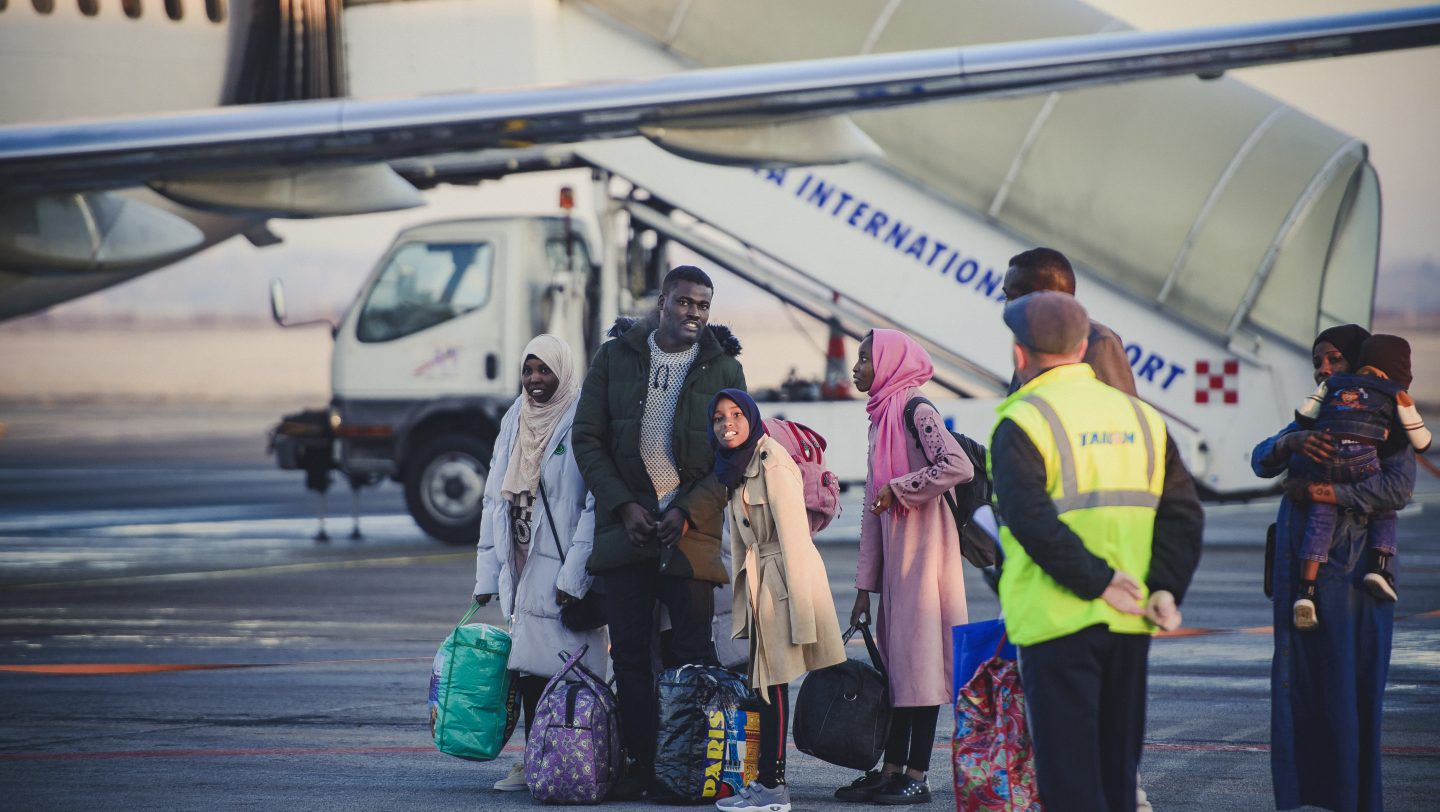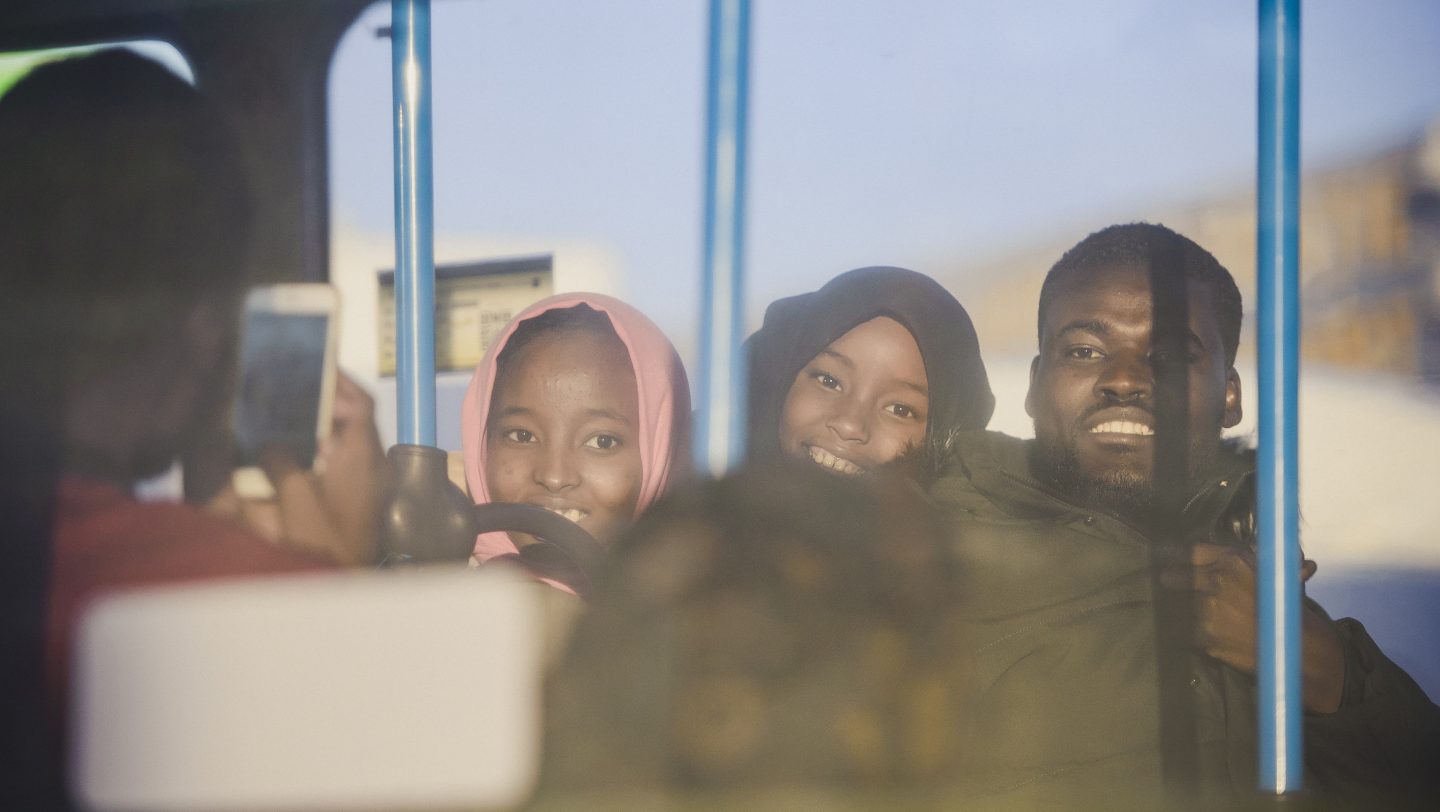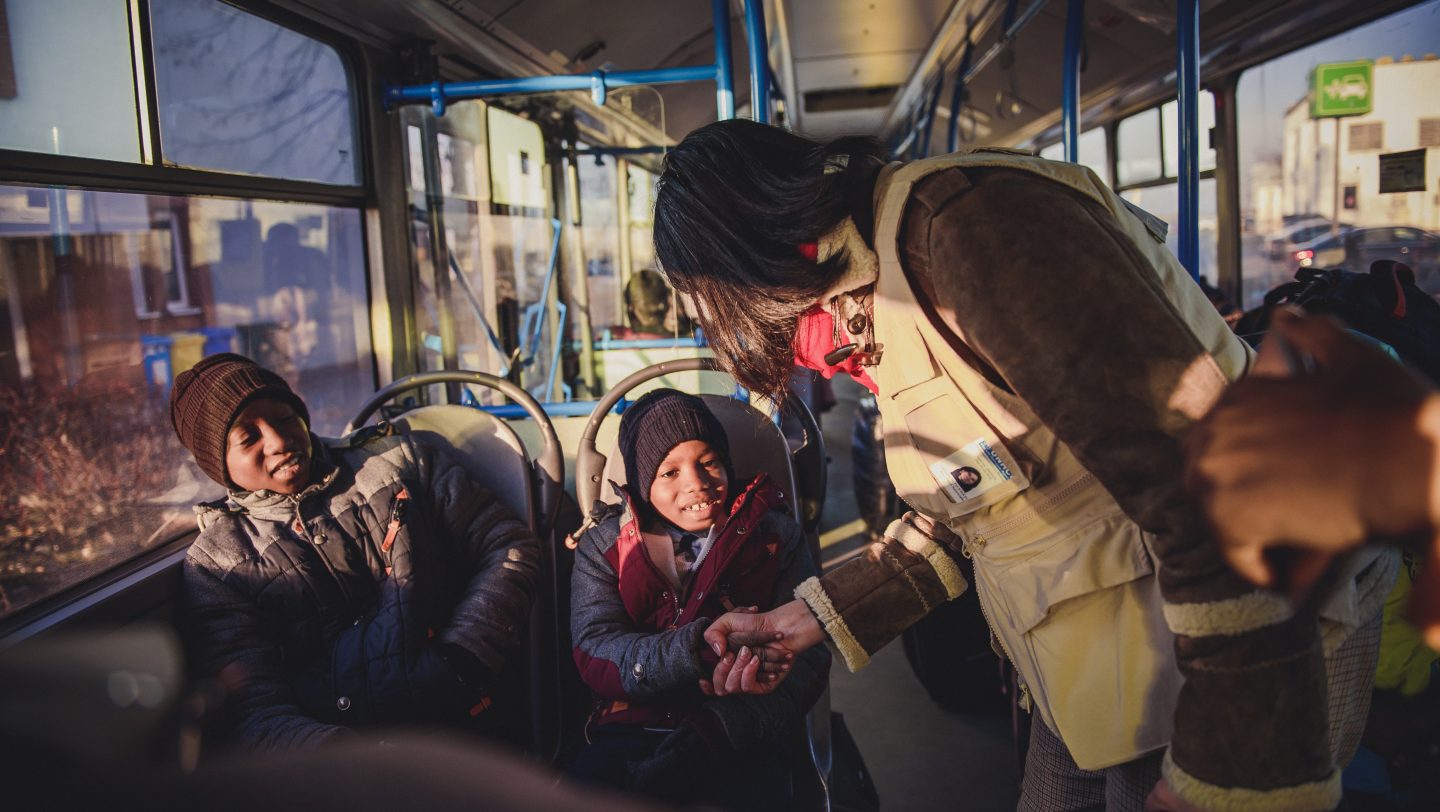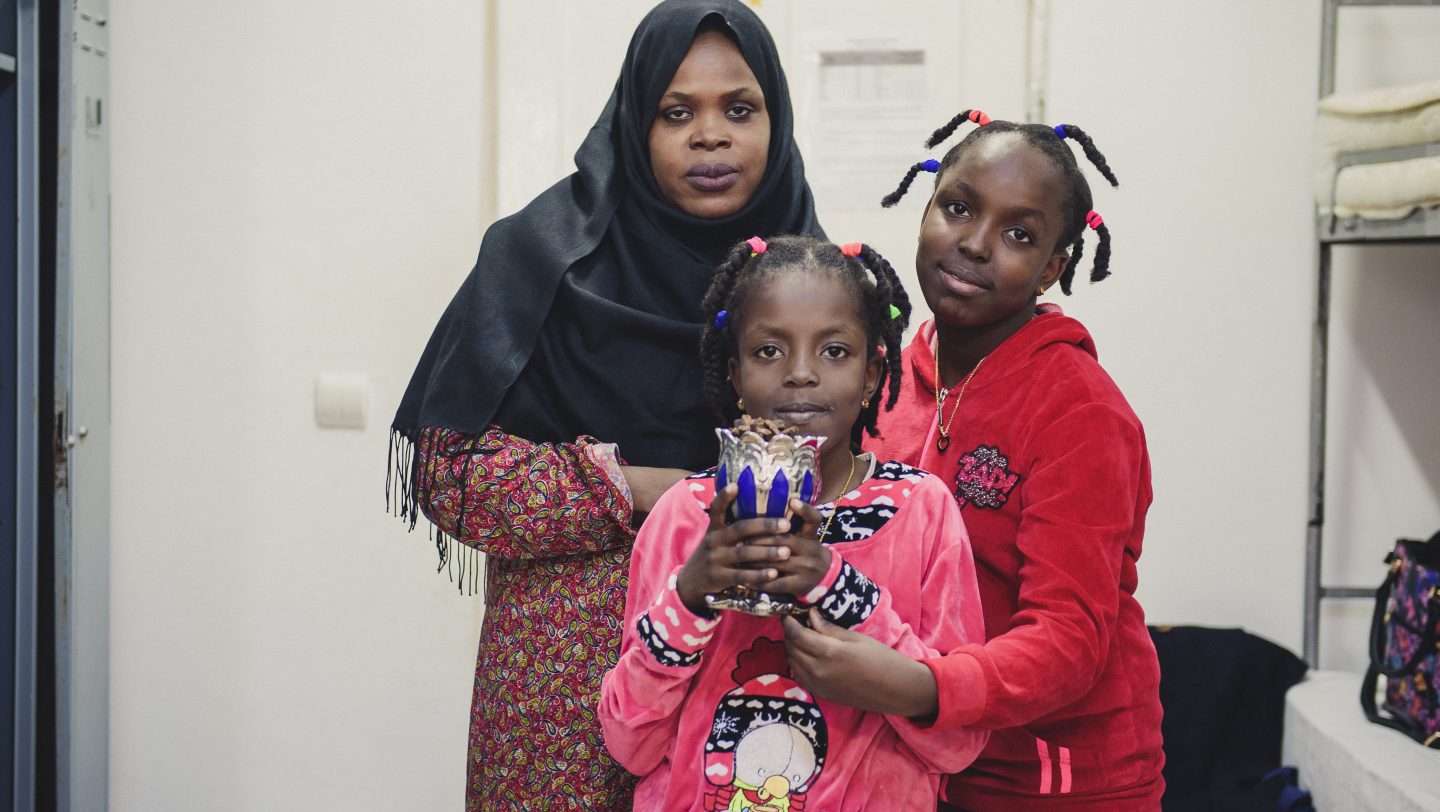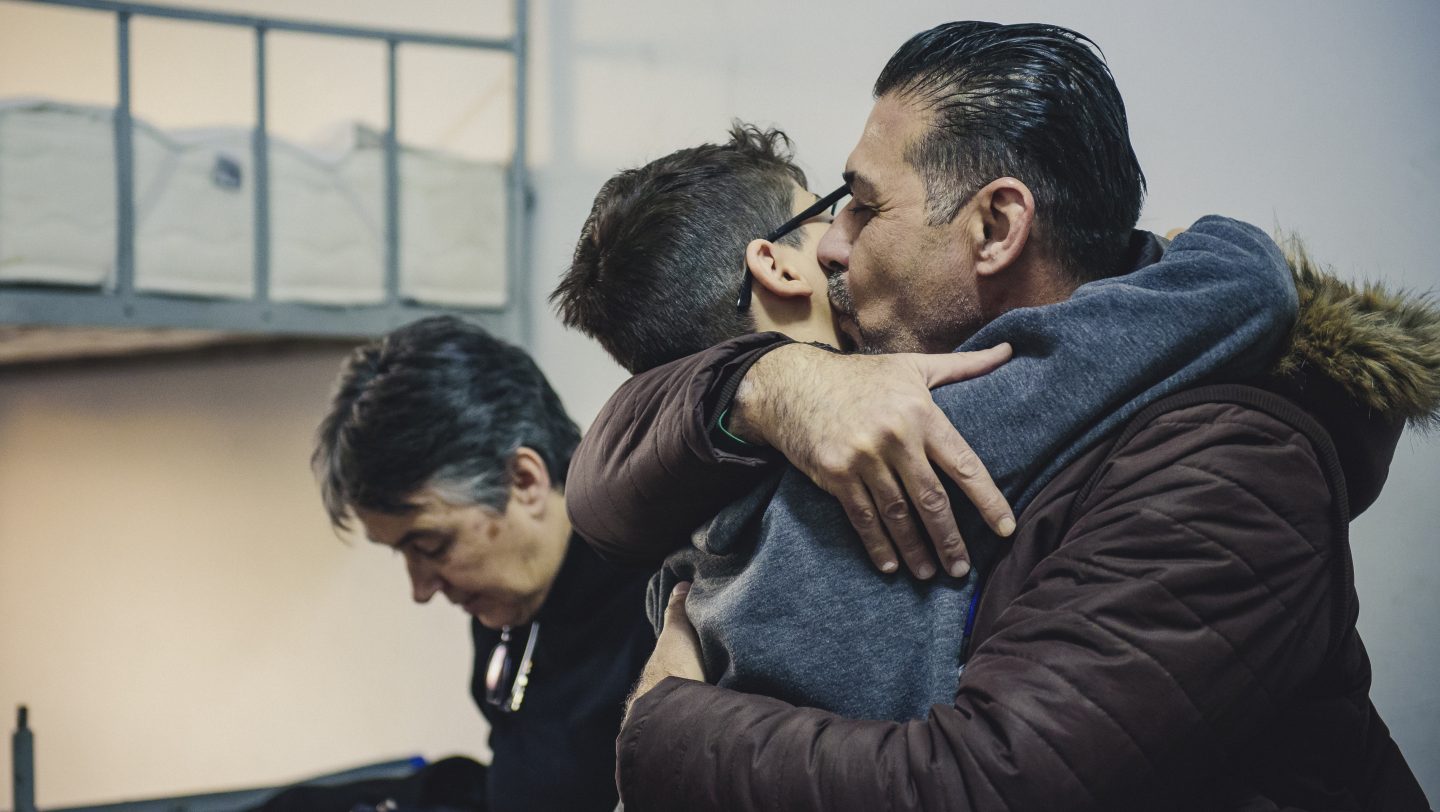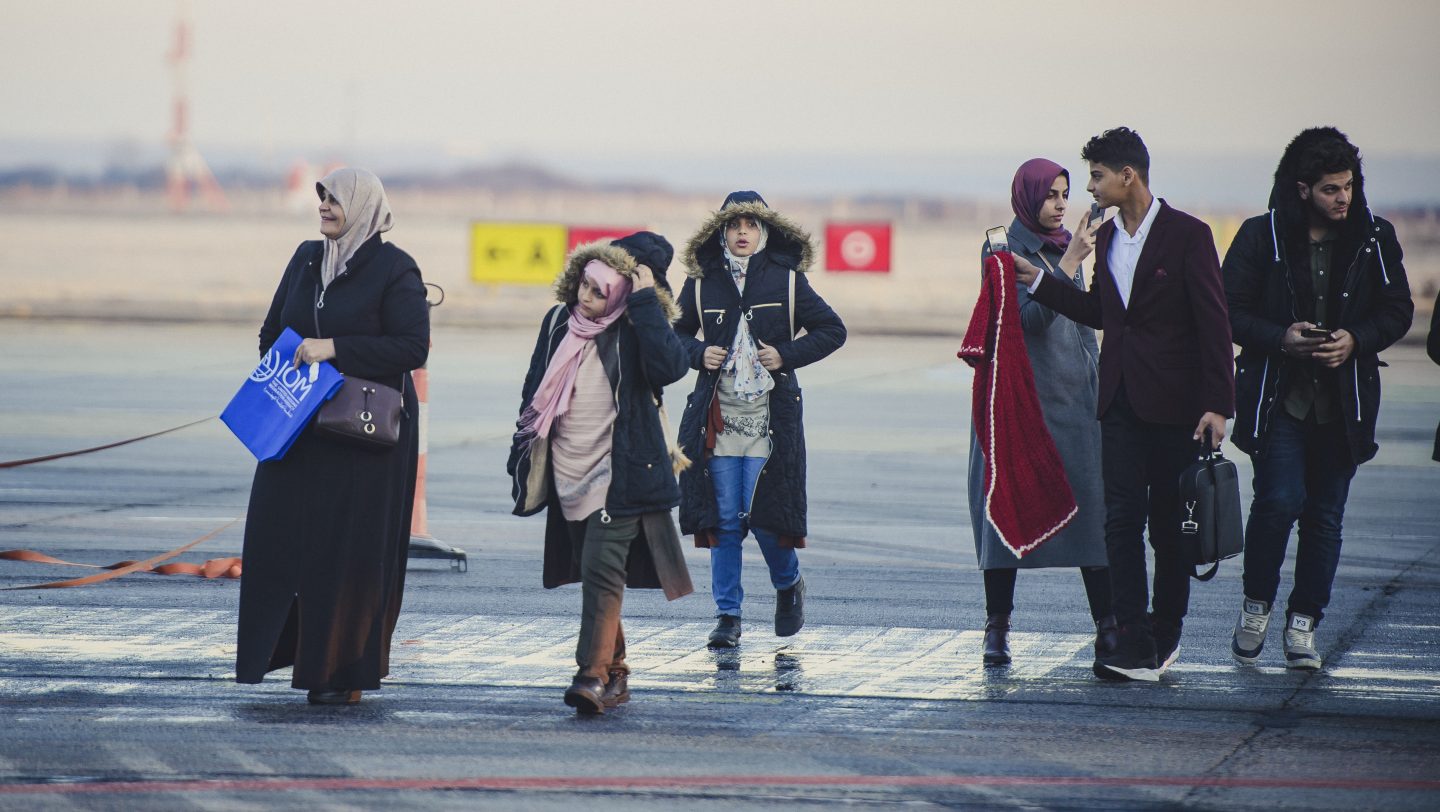A fresh start for some who have been refugees twice over
Refugees evacuated from hot spots in the Middle East reach a safe haven in Romania, where they will prepare for resettlement in Norway.
Ferase, 51, with his son, Abdulah. Originally from Baghdad, Ferase came to Timisoara with his parents, wife, brother and sister, a son, 11 and a daugher, 13, from Syria. © UNHCR/Ioana Epure
Twenty-four hours on planes and buses, and a group of Sudanese refugees who have been evacuated from Libya are still running on adrenaline when they reach the safety of a special transit centre in Romania. They are on their way to new homes in Norway.
“The journey was fine,” says Bashir M.H., 52, originally from Darfur, sitting gamely on an outdoor bench despite the frost. He surveys his new surroundings – two blocks of dormitories and a football field – and breathes with relief.
In one of the women’s rooms, Khaltoum A.R., 39, and her daughters Malaz, 11, and Maab, 8, are unpacking their suitcases.
“We were a bit tired but as soon as we got here, we felt a surge of energy,” says the mother as she pulls out clothes, slippers and large jars of thick, brown Sudanese incense.
“It’s an important part of our culture to make our homes smell nice. I make the incense myself from sandalwood, musk and flowers.”
What does it mean to be a refugee twice? “It’s depression,” he says. “Wherever you go, the problems follow you.”
The Emergency Transit Centre (ETC) in Timisoara will be home to the refugees until they can go on to their final destination. In Norway, they will be resettled and have the chance to build new lives.
The refugees have been through hell – twice. Because of war, they fled from Darfur to Libya, only to find Libya also descended into chaos. They have been plucked from danger in a joint operation by UNHCR and the International Organization for Migration (IOM) and are now temporary guests of the Romanian government, which operates the ETC.
The refugees arrived on ordinary commercial flights in a group of 51 – from Sudan, Eritrea and Syria. They left Tripoli early on 5 December and arrived in Timisoara at dawn on 6 December, having flown via Istanbul and Bucharest.
The darkest hour is before the dawn. They arrive at the ETC on special buses, jauntily flying little Romanian and EU flags.
“We are happy to receive them and get them into warm rooms and hot showers after the long journey,” says Camelia Nitu-Fratila, senior UNHCR field associate at the ETC.
Explaining how on the ground in war zones UNHCR identifies refugees in particular need, she says: “It is very difficult to quantify human sorrow. When a person is forced to flee, how do you choose? UNHCR tries to prioritize the evacuation of the most vulnerable.”
Among the evacuees are widowed mothers and families not only with children but also elderly grandparents.
At the receiving end are countries that accept refugees for permanent resettlement, such as Norway and the UK.
At the ETC, the refugees will meet immigration officials from these countries and do the paperwork needed to advance to their new homes. While waiting for the green light, they have language and cultural orientation classes. The time from evacuation to resettlement is typically two or three months. The ETC is a pit stop where they can rest.
Many of this morning’s Sudanese arrivals are starting to wilt and drop asleep but in another dorm, an Iraqi family who landed from Syria three days earlier is up and active.
“We were exhausted after our journey,” says Ferase A. A., 51, who travelled with his wife and two children, as well as his parents and brother and sister. “Damascus to Beirut by bus, then flight to Timisoara via Bucharest; I slept for 10 hours afterwards. But now we are looking forward… we are going to the UK.”
Back in Baghdad, Ferase was a merchant, trading in the raw materials to make pharmaceuticals. He lost everything in the war but hoped for a better life when he and his family moved to Syria. There, he worked as a doctor’s assistant in a hospital until life in Damascus also became unviable.
What does it mean to be a refugee twice? “It’s depression,” he says. “Wherever you go, the problems follow you.”
“The wars have gone on for so long. I want to tell European people about this. I want my voice to reach them.”
In Britain, he hopes to leave the jinx behind. “I have a good feeling about the UK. I know many nationalities live there; there is mix and that is good.”
Both his daughter, Rawsan, 13, and son Abdulah, 11, already speak some English. Rawsan wants be a doctor when she grows up. Abdulah wants to be a dentist “because there is not so much blood” in dentistry. Abdulah has brought his toothbrush and toothpaste with him.
On the bench outside the dorms, Bashir M.H. from Sudan is still awake. The former construction worker has painful memories of Libya, where corrupt militias held him for a ransom he couldn’t pay and handed him over to authorities who arbitrarily jailed him.
“I loved Libya but it became very hard,” he says, holding up a pack of cigarettes. “You could walk down the street and be robbed at knife point just for this. There is no order there now. The whole population has weapons, small and big weapons.
“I know Norway will be cold,” he continues. “But I will get used to it. I will do anything; any job I have to do.”
In the dormitory, another Sudanese refugee, 51-year-old widow and mother of six Hawa D.S., has just emerged from the shower and put on her best black and gold headscarf to meet us.
“Sudan used to be good,” she remembers. “We were cattle farmers before the war. Libya seemed like a place to escape to but…
“The wars have gone on for so long. I want to tell European people about this. I want my voice to reach them.”
Her eldest son, Mohamed, 26, completed four years of medical school in Libya and hopes to finish his professional training in Norway. “Ten years from now,” he says, “I see myself doing well because my new country will help me to be the best I can be.”

